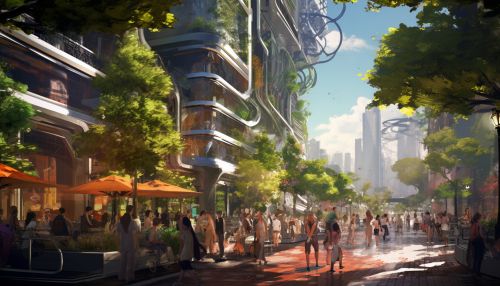Social Construction of Space
Introduction
The social construction of space refers to the idea that space is not merely a physical entity but is also shaped and given meaning by social interactions, cultural practices, and power dynamics. It is a concept that has been widely explored in fields such as sociology, geography, and urban planning.


Conceptual Understanding
The social construction of space is a theoretical perspective that posits that our understanding and use of space are not just determined by its physical characteristics but also by social, political, and cultural factors. This perspective challenges the traditional view of space as a fixed and neutral entity, asserting instead that space is dynamic and subjective, shaped by the interactions and experiences of individuals and communities.
Origins
The concept of the social construction of space has its roots in the works of various scholars in the 20th century. One of the earliest proponents of this idea was the sociologist Henri Lefebvre, who in his seminal work 'The Production of Space' argued that space is a social product, or a complex social construction based on values and the social production of meanings, which affects spatial practices and perceptions.
Key Principles
The social construction of space is underpinned by several key principles. Firstly, it posits that space is not a passive backdrop for social activity but is actively produced and shaped by social interactions and relations. Secondly, it asserts that space is imbued with meanings and values that are constructed through social and cultural practices. Finally, it recognizes that space is not uniform or neutral, but is marked by power relations and social inequalities.
Applications
The social construction of space has wide-ranging applications in various fields of study and practice.
Urban Planning
In urban planning, the social construction of space is a critical concept that informs the design and management of urban spaces. Planners recognize that the way urban spaces are designed and used can either facilitate or hinder social interaction, community building, and the expression of cultural identities. Therefore, they strive to create spaces that are inclusive, accessible, and responsive to the needs and aspirations of diverse communities.
Architecture
In architecture, the social construction of space is a key consideration in the design of buildings and environments. Architects understand that the design of spaces can influence social behaviors and interactions, and they use this understanding to create environments that foster desired social outcomes, such as collaboration, privacy, or community engagement.
Geography
In geography, the social construction of space is a fundamental concept that informs the study of spatial patterns and processes. Geographers examine how social constructions of space shape spatial practices and perceptions, and how these in turn influence social, economic, and environmental outcomes.
Implications
The social construction of space has significant implications for our understanding of society and space.
Social Inequalities
One of the key implications of the social construction of space is that it highlights the role of space in reproducing social inequalities. Spaces are often constructed in ways that reflect and reinforce existing power relations and social hierarchies, leading to spatial inequalities in access to resources, opportunities, and services.
Cultural Identity
The social construction of space also has implications for cultural identity. Spaces are imbued with cultural meanings and values, and they play a crucial role in the formation and expression of cultural identities. The way spaces are constructed can either affirm or marginalize cultural identities, with significant implications for social cohesion and cultural diversity.
Policy and Practice
Finally, the social construction of space has important implications for policy and practice. Recognizing that space is socially constructed can inform more inclusive and equitable approaches to urban planning, architecture, and public policy. It can also guide interventions aimed at transforming spaces to promote social justice, community engagement, and sustainability.
